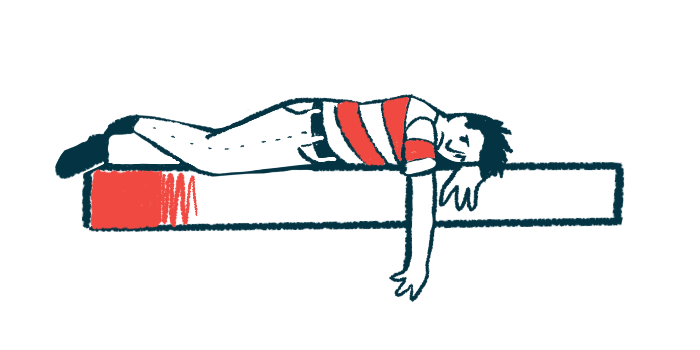Impaired Sleep in Prader-Willi Syndrome Linked With Psychosis Symptoms: Study

Sleep disturbances in people with Prader-Willi syndrome (PWS) are linked with psychosis-risk symptoms, a study reports.
Psychosis refers to disturbed thoughts and perceptions that may make it difficult to understand what is real and what’s not.
The findings also indicate neurobehavioral symptoms and cognition can be analyzed remotely in PWS patients, which may be of benefit in large-scale studies.
The study, “Neurobehavioral Dimensions of Prader Willi Syndrome: Relationships Between Sleep and Psychosis-Risk Symptoms,” was published in Frontiers in Psychiatry.
PWS is caused by the loss or impairment of paternal genes in chromosome 15 and is marked by multiple developmental, endocrine (hormone), and metabolic impairments. The disease is also linked with psychiatric manifestations, including intellectual disability, behavioral problems, and lack of attention, among others.
In this study, researchers at the University of California, Los Angeles evaluated neurobehavioral traits online, including psychosis-risk symptoms and sleep behaviors in 128 PWS patients (mean age 19.3 years; 53.9% women).
In almost half of the patients (48%), the disease was caused by the loss of paternal genes, while in about a third (36%) the cause was the inheritance of two chromosomes 15 from the mother — called maternal uniparental disomy (UPD). In rarer cases (15.4%), PWS was due to an imprinting mutation (inactive gene copies in both maternal and paternal sources) or an unknown mutation.
The study’s overarching goal was to identify neurobehavioral traits associated with psychosis risk.
Psychosis-risk symptoms were evaluated using a modified parent-report version of the Prodromal Questionnaire-Brief Version (PQ-B), which includes 21 questions addressing unusual thoughts and experiences and associated distress relative to these experiences.
“Importantly, this measure is designed to assess subtle symptoms of psychosis risk that may present many years before onset of overt illness,” the scientists wrote.
The researchers noted the questionnaire is not yet validated in the PWS population, so they underwent an additional analysis to confirm its validity.
Quality and duration of sleep, as well as daytime dysfunction due to sleepiness, nap frequency and duration, sleep satisfaction and sleep latency (how long it takes to fall asleep) were evaluated with the Pittsburgh Sleep Quality Index (PSQI). Higher scores indicate more severe sleep problems. In addition, the research team also used the RU-SATED scale to assess sleep health.
Cognition was evaluated in a subgroup of 40 PWS patients using an online neurocognitive battery that evaluates processes such as attention, memory, reasoning, and processing speed.
Of the 128 PWS patients, 100 completed the sleep questionnaires and 84 parents completed the PQ-B.
The PWS patients reported a series of psychosis-risk symptoms, with items related to cognitive disorganization (or impaired cognitive coordination) being the most common — 63.1% for understanding and 51.2% for talk. Unusual beliefs were reported by 38.6% and suspiciousness by 33.3%.
Regarding sleep, 45% of the respondents were rarely or only sometimes satisfied with their/their child’s sleep. More than half (57%) took a nap at least once a week and 11% reported sleep quality as bad or very bad. Also, 14% reported trouble sleeping in the previous month because they couldn’t breathe comfortably.
Over-the-counter or prescription sleep aids were used by 17% of the respondents, with 13% taking sleep aids at least once a week, and 10% more than twice a week.
Five parameters — sleep quality, nap frequency, sleep duration, sleep disturbance, and daytime dysfunction — were suggested by a statistical analysis as significant predictors of the frequency of psychosis-risk symptoms.
Compared to a group of normally developed people, PWS patients showed generalized accuracy deficits, especially in tasks involving faces. These deficits were mostly pronounced for face memory, age distinction, and emotion recognition.
Regarding speed of performance, PWS patients performed more slowly than typically developing young people. The greatest deficits were seen in attention and emotion recognition.
No significant differences were seen related to cognitive performance regarding the genetic cause of PWS.
The study suggests “PWS is associated with a high prevalence of distressing psychosis-risk symptoms, which were associated with sleep disturbances,” the researchers wrote.
The findings also “indicate that self/parent-reported neurobehavioral symptoms and cognition can be assessed remotely in individuals with PWS, which has implications for future large-scale investigations of rare neurogenetic disorders,” they concluded.
The team did note, however, that “future research in a larger sample is required to validate our findings on neurocognitive predictors of psychosis-risk symptoms and investigate neurocognitive differences between genetic subtypes of PWS.”







